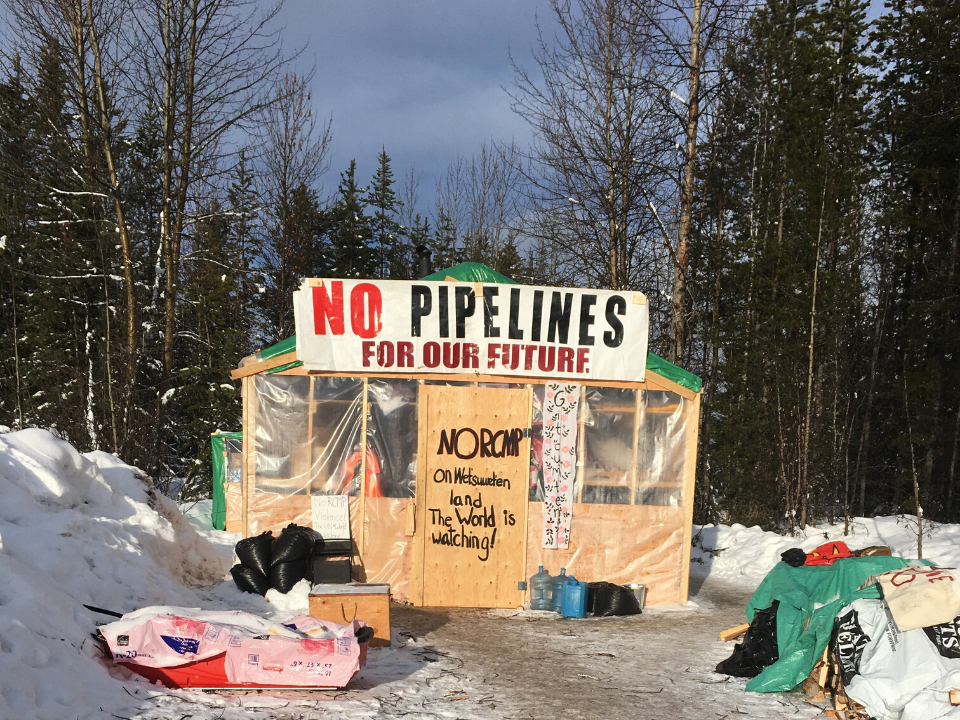It was dark when we arrived at the Gidimt’en camp outside Houston, B.C., with a trunk full of groceries and winter camping gear for everyone to share. My colleague and I were volunteers with Christian Peacemaker Teams, and had travelled to the site at the 27-kilometre mark along Morice West Forest Service Road in response to a call from Wet’suwet’en leaders for legal observers. It was evening in early February, and the camp was lit with the glow of a bonfire. The sound of people chopping firewood filled the air.
“This is bush life,” said one person while we were being oriented to the camp.
“Where do you get your drinking water from?” I asked, thirsty.
“The river gives good water,” said one supporter. I hesitantly dipped my bottle into the Wedzin Kwa — a source of concern for land defenders, who want to protect the river. The water was pristine and refreshing, a far cry from what First Nations under boil-water advisories experience every day.
More on Broadview: Wet’suwet’en acts of solidarity by youth give me courage
Walking into the woods that first night to reach the outhouse, I stopped in my tracks. I had the distinct feeling I was being watched. I knew the RCMP checkpoint was only one kilometre away. But this visceral feeling of being watched was different and very close. I stopped on the snowy path, my gaze directed toward the trees, and I introduced myself. I declared my intentions for being in the territory: to monitor and document police behaviour, and to do no harm.
There is a presence here. This land is sacred. We stayed for about a week at Gidimt’en camp, and moments of prayer and ceremony highlighted our time there. Being on this beautiful land and meeting the people on the frontlines has transformed my engagement from one of intellectual knowledge to a deeper spiritual and physical understanding. It’s one thing to read about the region: I was inspired by the landmark Delgamuukw case, which found that Aboriginal land rights and title in the area had never been extinguished. But it’s another to hear first-hand stories from people about what this territory means to them. I met a nine-week-old baby with big, bright eyes who smiled when I said, “What do you think of all this? All this is for you and the children to come.” An elder confronting the RCMP at the checkpoint restricting people’s access to the territory one day drove this point home: “We’re not doing this for us. We’re defending the land for the children to come. Not just First Nations children, all children.”
There is a presence here. This land is sacred.
During our time at the camp, we witnessed the overwhelming presence of heavily armed police and tactical units to defend an injunction passed to protect Coastal GasLink’s project. I was arrested on Feb. 8 with several others when the RCMP expanded their “exclusion” zone in the area, and held in police custody for two days. It doesn’t matter how many apologies have been issued for residential schools, potlatch bans and other acts of oppression and genocide against Indigenous peoples when the reality on the ground says otherwise. This is why many are declaring that “reconciliation is dead.”
But this movement of respect for Indigenous rights, crystallized at this time by the Wet’suwet’en struggle, is an important opportunity for church and society to show up and demonstrate what reconciliation could look like. Many churches have been committed to the Truth and Reconciliation Commission’s calls to action and hosting the Kairos Blanket Exercise program to learn about Canada’s colonial history and their complicity in it. Faith communities have a real opportunity to step up and bravely engage in these issues, as places where people have a foundation of shared values and established relationships.
Broadview is an award-winning progressive Christian magazine, featuring stories about spirituality, justice and ethical living. For more of our content, subscribe to the magazine today.
















Natalie introduced me to the plight of Palestinians under Israeli occupation, and continues to open my heart, highlighting the plight of my closer Indigenous neighbours seeking the right to control what happens on their land in Canada. Thank you, Natalie.
The Coastal GasLink Pipeline consultations began in 2010, and resulted in agreements with all 20 elected First Nations bands along the path of the pipeline — including the Wet’suwet’en. According to a 19 Feb 2020 report there were more than 100 in-person meetings with the Wet’suwet’en hereditary chiefs. According to the same report, the company engineers cooperated with the hereditary chiefs requirements to honour the land. And some First Nation leaders see this cooperation as not only a path to economic prosperity for their own people but also a way of working toward reconciliation with the rest of Canada.
great insight, thank you
I firmly believe the pipeline should NOT go through Indian lands if they are against it. It is the responsibility of the oil companies and the government to come up with alternative routes.
Blocking the train lines does not help the situation.
The workers who have been laid off because of the blockades are just average people trying to make an honest living and again, should not be penalized.
The average Canadian should not have to have their transportation and the transportation of goods disrupted either.
It is the responsibility of the government to respect RIGHTS of the indigenous people NOT to support the major corporations trying to railroad (excuse the term) this pipeline through.
This land belongs to the Indians and they have a right to refuse the pipeline being built on their lands.
The indigenous people and the rest Canada should not be penalized by our government because big business does not want to shell out the money to build an alternate route.